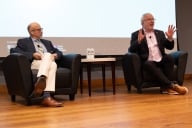You have /5 articles left.
Sign up for a free account or log in.
A veteran of for-profit higher education has built a new online learning portal, this time a nonprofit. And Michael K. Clifford’s DreamDegree.org, which went live last month, already offers 27 courses that can lead to college credit at many colleges.
The site’s general education courses range from English composition to computer applications and intermediate algebra. They are instructor-led but self-paced, and are designed to be completed in six to eight weeks.
Each course costs $299, or about $100 per credit. The non-accredited site’s goal is to “shift power to the student,” Clifford said, by allowing them to cobble together credits to get a head start on college or toward finishing a degree. He touts the "low price, convenience and academic rigor" of DreamDegree, which has signed up 30 students so far.
Clifford took plenty of heat a few years back for his high-profile role as a for-profit college entrepreneur, most notably with an unflattering star turn in a "Frontline" exposé on the industry, which PBS aired in 2010.
He specialized in purchasing struggling nonprofit colleges -- complete with regional accreditation -- and converting them into for-profit institutions. That practice is no longer en vogue, thanks to scrutiny from federal lawmakers and accreditors.
These days Clifford talks up the advantages of being a nonprofit. It helps, he said, in working with traditional college partners or in looking to operate in other countries, like India.
DreamDegree will spend 33 percent of any operating surplus it earns on student scholarships, said Clifford. And unlike other colleges, "we're not accepting donations."
However, Clifford said the site seeks to exist within “current academic structures.” It does not challenge traditional credentialing, colleges or regional accreditation.
While DreamDegree is a nonprofit, its courses are owned by a related company -- DreamDegree Academics, LLC. Clifford said the two entities have a "strategic agreement." And he hopes to license online courses to community colleges through the for-profit side of the operation.
The credit pathway for DreamDegree is through transcripts from the American Council on Education (ACE), higher education’s umbrella group. After conducting an academic review, the council deemed all of DreamDegree’s 27 courses to be credit-worthy. About 2,000 institutions will consider offering credit based on ACE's credit recommendations.
“These are stand-alone courses,” said R. Wayne Clugston, a senior academic adviser to the site. “We are not offering a certificate or credential.”
Like Clifford, Clugston has a background in for-profit education. He said building the site’s coursework was completed in phases over three years. And the company hopes to add to its 27 courses soon.
“We’ve been talking about 10 new courses a month,” Clugston said.
Emerging Market?
DreamDegree is the newest arrival among a dozen or so online course providers that are not accredited but feature a way for students to earn college credit, albeit circuitously. This group includes StraighterLine, Pearson’s Propero, the Saylor Foundation and the major MOOC providers Coursera, edX and Udacity. These portals also exist outside of the reach of federal financial aid – and related regulations.
Another somewhat similar player is Penn Foster, a pioneer in distance learning, which offers individual online courses well as degree and certificate programs. Vocational tracks at Penn Foster feature regional and national accreditation while college degree tracks come with national and programmatic accreditation. The for-profit and online Penn Foster now offers more than 110 relatively inexpensive courses that can earn ACE credit recommendations.
Individual online courses can be attractive to students, said Frank Britt, Penn Foster’s CEO.
“We see many students engaged in so-called ‘course economics arbitrage’ which is the growing practice of taking advantage of a price difference between traditional schools and Penn Foster, yet with comparable quality and accreditation,” Britt said via e-mail. “Consumers capitalize upon the imbalance.”
Some observers are taking DreamDegree seriously, in part because it already touts a large number of ACE credit recommendations. In contrast, just five Coursera offerings have earned the council’s stamp so far, more than the other major MOOC providers. StraigherLine, however, has more than 50.
By some estimates, as much as $2 million has been invested in DreamDegree. But Clifford declines to reveal an exact amount.
He said one of the site’s biggest draws will be free “personal education coaches,” who will help students earn credit for courses. The coaches will create anonymous academic profiles of students that partner colleges can access for a fee of $99 per month, Clifford said. In what sounds like a new twist on lead generation, institutions can then bid on students with scholarships and offers of transfer credits.
Students will interact with three types of coaches employed by the site, according to Clifford, including instructors, academic coaches and the personal coaches focused on transfer.
DreamDegree’s articulation agreements with colleges, which are still in the development phase, would lock in transfer arrangements, including courses accepted and tuition levels.
“The schools have to go through the personal coach,” Clifford said. “We won’t want to take an offer to students unless it’s ironclad.”
Researchers at the University of Central Florida helped design some of the site's technology.
The Mixed Emerging Technology Integration Lab, which is part of the university’s Institute for Simulation & Training, worked on mobile applications for the site’s courses as well as adaptive software and identity verification technology, said David Metcalf, the director and a senior researcher at the lab, who is listed as a founder on DreamDegree’s website.
The new site is a “high-tech and high-touch” model, said Metcalf, which is “the best of what MOOCs have to offer.”
New Approach
Clifford is a colorful character. The LinkedIn profile of the former professional musician, who does not hold a college degree, lists his education as “Hard Knocks U.”
He received a few hard knocks, as well as financial success, during the boom days of for-profit higher education. Clifford played a part in the founding of Bridgepoint Education and Grand Canyon University, he says, mostly through helping to arrange the purchase of nonprofit colleges.
Clifford tried a similar approach with Myers University, a bankrupt private institution located in Cleveland, which he bought in 2008 and converted into the for-profit Chancellor University. He persuaded Jack Welch, the former CEO of General Electric, to buy a stake in the university. But Chancellor subsequently came under fire for operating deficits and a news report alleging that it had a strategy of recruiting from homeless shelters. The university will allow its regional accreditation to expire this fall.
Through his Clifford Capital and Significant Federation, Clifford currently owns Victory University and United States University.
DreamDegree's site includes logos of several universities that offer ACE credits, including traditional institutions like Ohio State University and Boston College. Clifford said DreamDegree is not implying that those institutions are partners, noting that the website describes them as members of the “ACE network.”
The site's leaders said they have received interest from colleges, students and lawmakers.
For example, California’s Legislature is currently considering a bill that would create a pool of approved online courses from outside providers that would be aimed at students at the state’s public universities and community colleges. Clifford said his organization has spoken to people involved in crafting that legislation. "We could be the only nonprofit solution to California's new legislation," he said.
Whether or not DreamDegree will be part of the mix, experts said the market for individual course providers is growing.
“We did it first,” said Burck Smith, StraighterLine’s founder and CEO. “More will be coming.”








